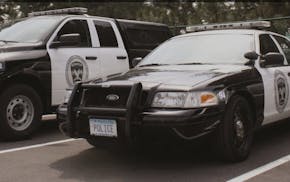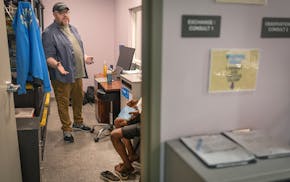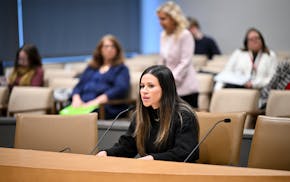Gov. Tim Walz has been to the Minnesota State Fair plenty of times, usually appearing on Day 1. But Walz, now the Democratic candidate for vice president, has yet to show up this year. Of course, he's been busy.
After his speech Tuesday before the Democratic National Committee's Youth Council, Walz was asked by WCCO reporter Susie Jones if he planned to go to the State Fair. With several people trying to speak to him, Walz at first said, "Unsure," then looked back, pointed at the camera and said, "The State Fair, I'll be at," before walking away.
If Walz does in fact plan to get to the fair, there are no formal plans yet, according to a spokesperson in the governor's office. Even more of an unknown: whether he would wear his corn dog socks again.
Susan Ritt, a spokesperson for the State Fair, said Thursday that neither the Trump nor the Harris campaigns have reached out to fair officials about a potential visit by the candidates. "That doesn't mean they won't," she added.
National political figures have trained an eye on the Minnesota State Fair as far back as 1878. That includes at least 10 presidential candidates, six sitting vice presidents, two sitting presidents and four future presidents.
One of them even made history at the State Fair: Theodore Roosevelt delivered his famous "speak softly and carry a big stick" speech at the fair as vice president in 1901, just two weeks before becoming president following the assassination of President William McKinley.
Here's a list of those visits, according to fair officials and archives:
1878: President Rutherford B. Hayes visited the fair before the event moved to its permanent fairgrounds in 1885.
1910: President William Howard Taft visited the fair, as did ex-President Roosevelt. Two years later, Roosevelt was back again, this time as the Progressive Party candidate running against Taft. Both lost to Woodrow Wilson.
1920: Three presidential candidates, all of them from Ohio, visited the State Fair to speak at the grandstand: eventual winner U.S. Sen. Warren Harding, Gov. James Cox and Prohibition Party candidate Aaron Watkins. Cox and Harding were given oil paintings by Minnesota artist Knute Heldner.
1922: Vice President Calvin Coolidge visited the State Fair, a year before he ascended to the presidency when Harding died of a stroke. Coolidge received jeers after speaking for 45 minutes on a 90-degree day — an unusually long speech for a man known to use few words.
1947: Gen. Dwight Eisenhower delivered a speech at the State Fair, six years before he became president in 1953. Said Ike: "It is the first State Fair I've ever attended, and I hope I have made a good beginning by visiting the greatest first. Such a fair represents the things that America needs."
1965: Vice President Hubert Humphrey, who had been to the State Fair many times before, gave a speech at the dedication of a building named for D.K. Baldwin, the fair's former secretary and general manager.
1980: John Anderson, an Illinois congressman running for president as an independent, and Vice President Walter Mondale, who was running for re-election with Jimmy Carter, visited the fair.
1987: U.S. Sen. Bob Dole of Kansas and Massachusetts Gov. Michael Dukakis, both running for president, visited the fair. Dukakis would be the Democratic nominee in 1988, Dole the Republican nominee in 1996.
1996: Vice President Al Gore, running for re-election, delivered a speech on Machinery Hill and jokingly asked where he could find some cheese curds. Gore again visited the State Fair while running for president in 2000 and attended the Tanbark Saddle Club's Cavalcade of Roses horse show.
2004: Democratic presidential nominee John Kerry made a surprise visit on opening day of the fair, shaking hands and visiting various barns. Vice President Dick Cheney held a town hall meeting in the grandstand and visited Sweet Martha's Cookies. And U.S. Sen. John McCain, who would run for president four years later, held a rally at the fair.
2019: U.S. Sens. Amy Klobuchar and Bernie Sanders of Vermont both campaigned for president at the fair.
Briana Bierschbach contributed to this report.

One man dead in shooting Friday outside Northtown Mall in Blaine

Four arrested, no one injured in fighting and shooting following Burnsville High School graduation

Meth makes comeback in Minnesota in more dangerous and record ways
U faculty and students fear budget cuts and tuition hikes will reduce staffing and enrollment
